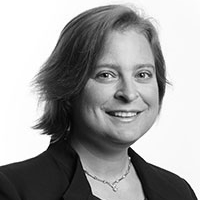
Associate Professor Pinar Karaca-Mandic teaches healthcare marketplace and healthcare finance. She is the Academic Director of the Medical Industry Leadership Institute (MILI) in the Department of Finance.
She is a Research Associate at the National Bureau of Economic Research (NBER), in Health Economics and Healthcare programs. She also serves as an Associate Editor of Forum for Health Economics and Policy, and an Editorial Board Member for the International Journal of Health Economics and Management.
Prior to joining the Carlson School faculty, Karaca-Mandic was Associate Professor of Health Policy and Management at the University of Minnesota’s School of Public Health.
She holds a Ph.D. in Economics from University of California at Berkeley, and BA in economics and mathematics, and a concentration in public policy from Swarthmore College.
Will the future of healthcare be most significantly defined by reigning in costs or accelerating outcomes?
This is like a chicken-and-egg problem and both are important. I tend to lean towards reining in costs for the following reason: If innovations with high promise for improving health outcomes and saving lives are not affordable, they will not be accessible to most people who would benefit from them. In that case, what is their value to the society? Not much.
What is the definition of value in healthcare today and what should it be?
We have a complex healthcare system. Stakeholder incentives do not always align, and value can have a different meaning to each party; the definition of value should not be stake-holder dependent.
As an economist, I define a product’s value by the demand curve or consumers’ willingness to pay for that product. In healthcare, the ultimate consumer is the individual who receives services, and thus the definition of value is “innovations and therapies for which individual healthcare consumers have high preferences, receive improved health outcomes, and experience higher functional and quality of life.”
There are three key levers to improving value:
- Improve innovation and availability of healthcare services that are effective and add to quality of life, survival, and productivity.
- Increase access to “high value healthcare.” This increases the number of healthcare consumers benefiting from services and innovations and improves social value.
- Reduce costs by eliminating waste and unnecessary, low-value care. Financial efficiency will make the social value of services available to a broader population of healthcare consumers.
My late senior faculty mentor Dr. Robert (Bob) Kane, an international expert on long-term care services said, “Incentives should be aligned with desired outcomes. Pay for outcomes; regulate towards outcomes. Social and psychological outcomes count.” Another Bob Kane slogan that I embrace as an economist is “Buying unwanted product, even at a discount, is no bargain.”I think these truly nail down what value in healthcare should be.
What’s the biggest “blind spot” in healthcare today?
Healthcare is disproportionately focused on short-term rather than long-term perspectives. Taking accountability for the healthcare consumer requires a long-term approach, but this is difficult in our current system that is plagued by policy uncertainties; lack of transparency and interoperability; and the absence of strong alignment across policy, business, clinical practice, and research. Even if research and data produce evidence-based recommendations, making real change in health policy, in business models, or in clinical practice faces strong headwinds because of the heavy focus on short-term perspectives and economic incentives.
What’s the academic’s community biggest “blind spot?”
Academics tend to live in silos. We often get comfortable doing what we do best: producing high-quality knowledge in our specialized area of expertise. In addition, streamlined tenure and promotion processes in universities disincentivize collaboration with researchers from different disciplines.
Overcoming this blind spot is essential. Academics and researchers need more interdisciplinary work because the path to discovery often lies in integrating seemingly unrelated but complementary pieces.
How are you trying to make an impact on healthcare?
My research focuses on understanding how healthcare markets work and identifying inefficiencies in the interactions between consumers, insurers, medical innovators, and providers. I focus on both market-based and regulatory mechanisms to address such inefficiencies. I also have a dedicated research agenda to understand how new effective medical innovations are adopted, as well as how ineffective or unsafe medical treatments are de-adopted.
As the Academic Director of the Medical Industry Leadership Institute (MILI) at the Carlson School of Management, I focus on empowering students with the tools they need to become talented healthcare leaders and entrepreneurs with sharp business acumen, state-of-the art skills, and empathy.
What is the one thing, other than time or money, you wish you had more of?
After college, I immediately entered an economics PhD program at UC Berkeley. I started my research career at RAND Corporation and then transitioned to the University of Minnesota. So, I wish I had more insight into how things are done in the “real world.” My wish is coming true since, in my role as the Academic Director of MILI, I have the unique opportunity to discuss research with business executives, policy makers, physicians, and innovators of medical technologies.
Want to learn more about the Medical Industry Leadership Institute? Visit https://carlsonschool.umn.edu/faculty-research/medical-industry-leadership-institute
This interview with Dr. Karaca-Mandic, has been lightly edited for clarity and length.
6 Questions is a new interview series with Medical Alley leaders on the future of healthcare. Medical Alley Association’s membership includes leaders in healthcare delivery, payment, technology, and policy, which gives us – and in turn, you – access to diverse perspectives on how healthcare is changing and what lies ahead.
Medical Alley is the global epicenter of health innovation and care; 6 Questions is meant to share insights and spark discussion. If you have a perspective on the future of healthcare, feel free to share it by reaching out to Frank Jaskulke, Vice President of Intelligence at fjaskulke@medicalalley.org
